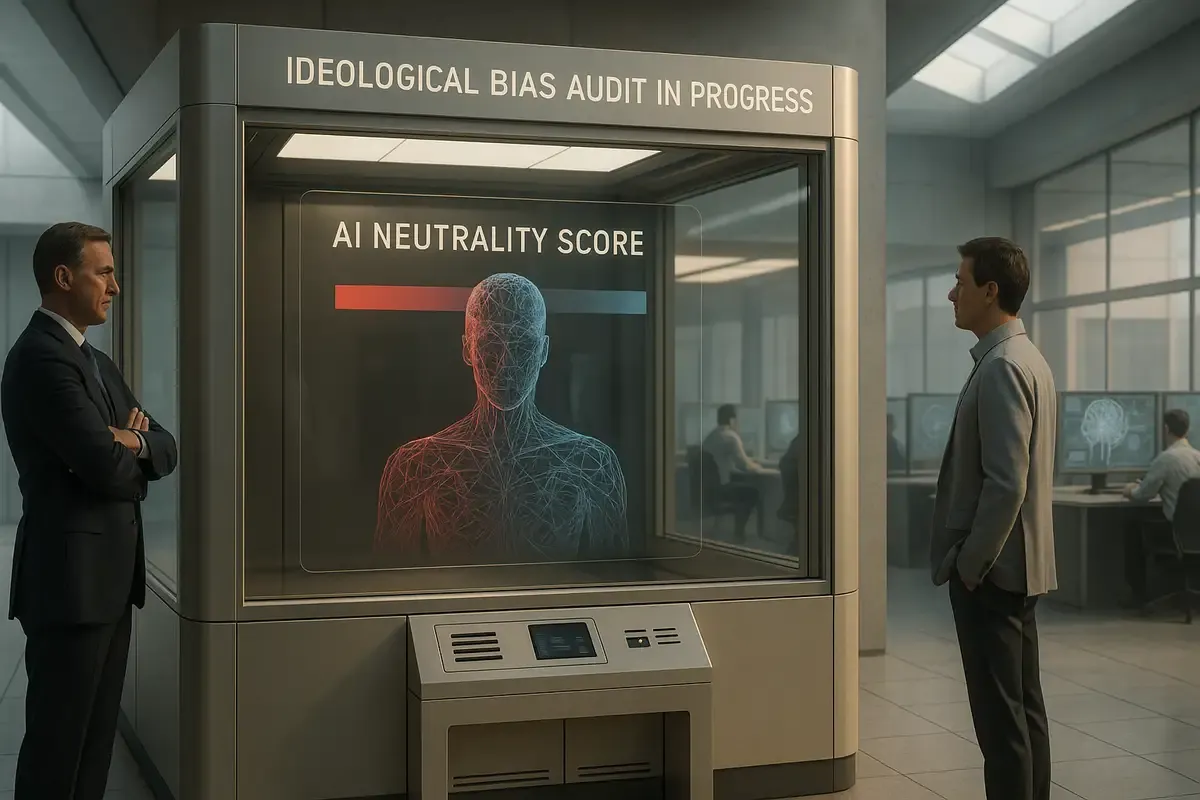Good Morning from San Francisco,
Trump wants neutral AI. Spoiler: it doesn't exist. Every algorithm contains human bias baked right in. Meanwhile, America's $1 billion chip war backfired spectacularly. Export controls meant to starve China's AI ambitions instead created a thriving black market. Smugglers openly sell banned Nvidia processors like seafood.
On a lighter note, Google built an AI that reads damaged Roman inscriptions better than most historians. Two thousand years later, machines decode what emperors carved into stone faster than the experts who study them for a living.
Neutrality remains elusive. Markets adapt quickly.
Stay curious,
Marcus Schuler
Trump Demands Neutral AI. Algorithms Don't Work That Way.
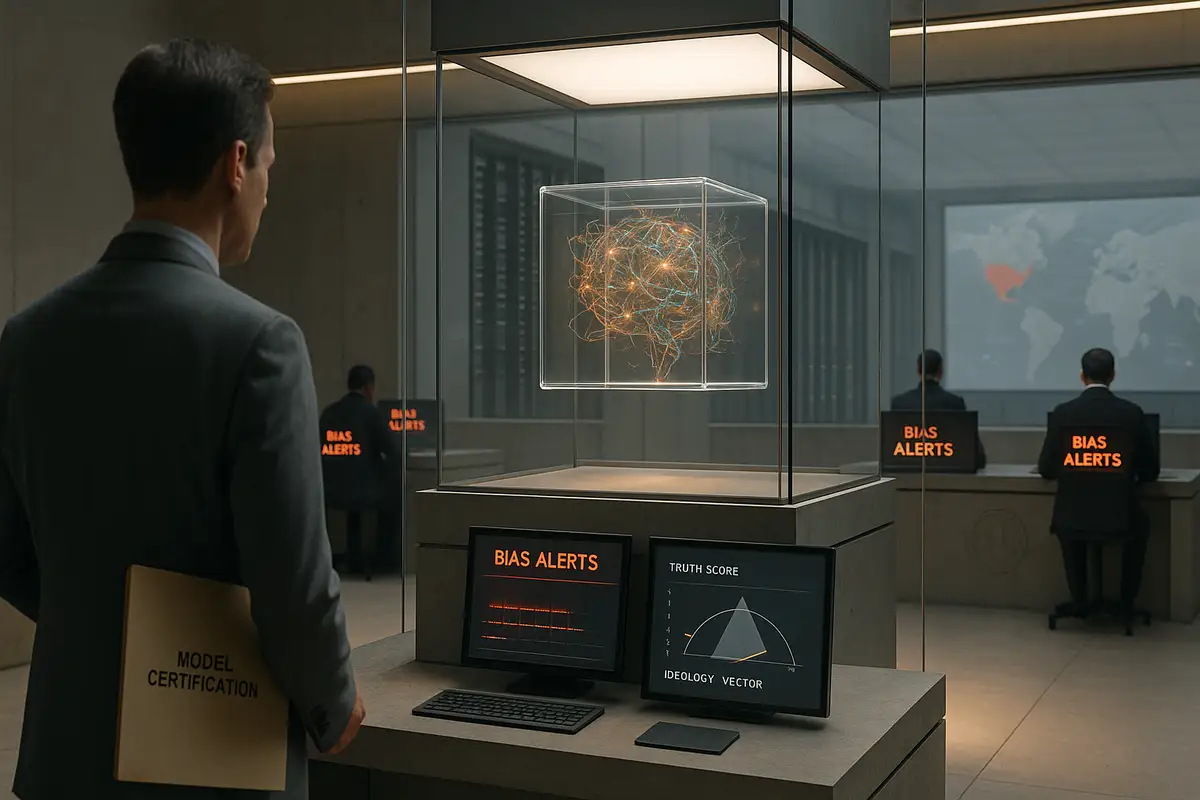
The Trump administration announced Wednesday it will test AI systems for "ideological bias" and block companies from $100 billion in federal contracts if their products fail neutrality tests.
The policy targets perceived liberal bias in systems like ChatGPT and Google's Gemini. Remember when Gemini created images of Black founding fathers and female Nazi soldiers? That $97 billion market value loss taught everyone about AI's bias problems.
But here's the issue: neutral AI doesn't exist. Every system contains human judgment baked into its foundation. Someone picks the training data. Humans rate responses during development. These choices shape how AI behaves.
Stanford researchers proved this. They showed conservatives and liberals the same AI response. Conservatives called it liberal. Liberals called it conservative. Neutrality lives in the eye of the beholder.
Tech companies responded with theater. Sam Altman donated $1 million to Trump's inauguration after once comparing him to Hitler. Meta dissolved DEI departments. OpenAI scrubbed diversity promises from its website.
Yet the actual models haven't changed. ChatGPT still answers questions the same way. The performance is pure politics.
Constitutional lawyers warn the policy violates First Amendment protections. Political speech gets the highest legal protection. Courts will likely strike this down.
Why this matters:
• The demand for "neutral" AI reveals how little policymakers understand the technology they're trying to regulate
• Using procurement rules to enforce political conformity turns government contracts into culture war weapons
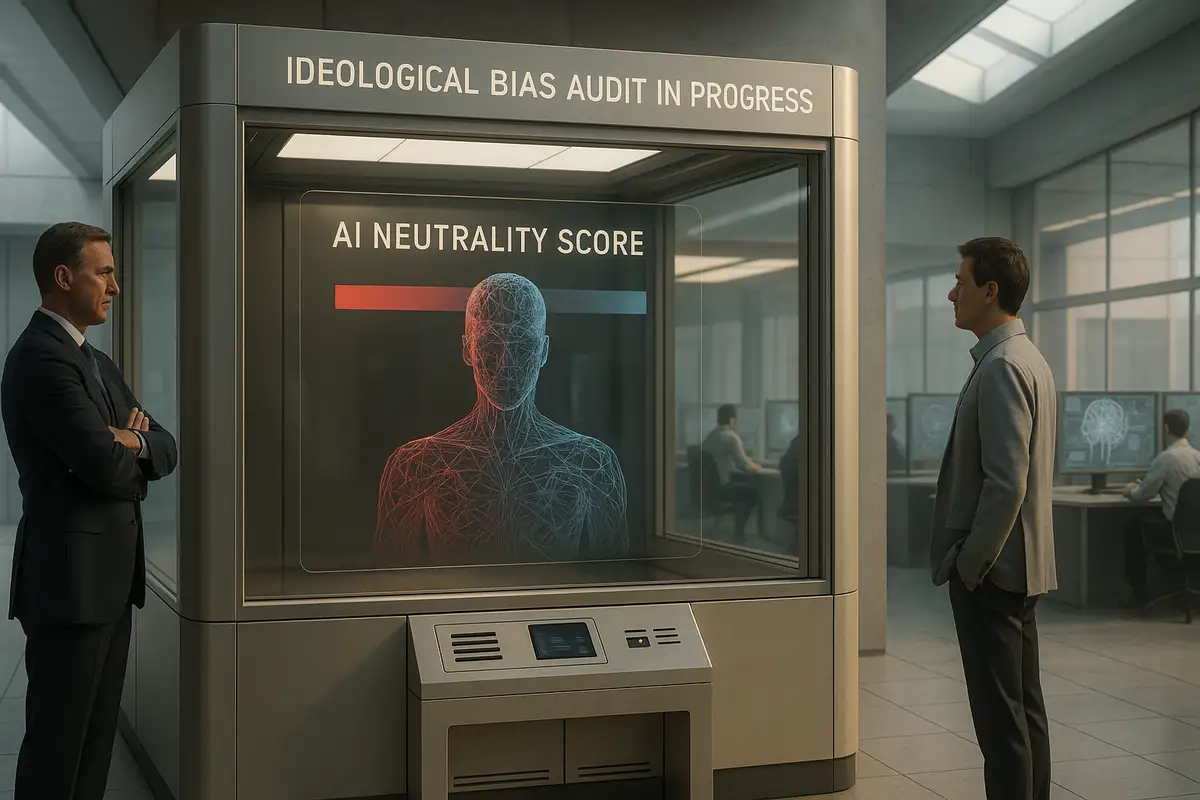
AI Image of the Day

Prompt:
`a person with a circular head, rectangular torso and limbs, facial features and clothing as solid black geometric shapes, holding a taut leash, a small dog (emotion symbol) with geometric form (circular head, simple rectangular body), dynamic interaction where the person stands steady (not pulled by the dog), dog leaning forward with eager posture but restrained, flat illustration style, layered silhouette composition, pure yellow background, only black and yellow color palette, subtle details (leash texture, clothing trim, dog's tail flick), clean lines, balanced simplicity and delicacy, central focus on human-dog interaction, crisp edges, highly detailed, visually appealing, masterpiece` Negativeother colors (red, blue, green), non-geometric shapes, excessive complexity, blurry lines, low contrast, 3D elements, shading gradients
America's $1 Billion Chip War Backfire: How Export Controls Created What They Tried to Stop
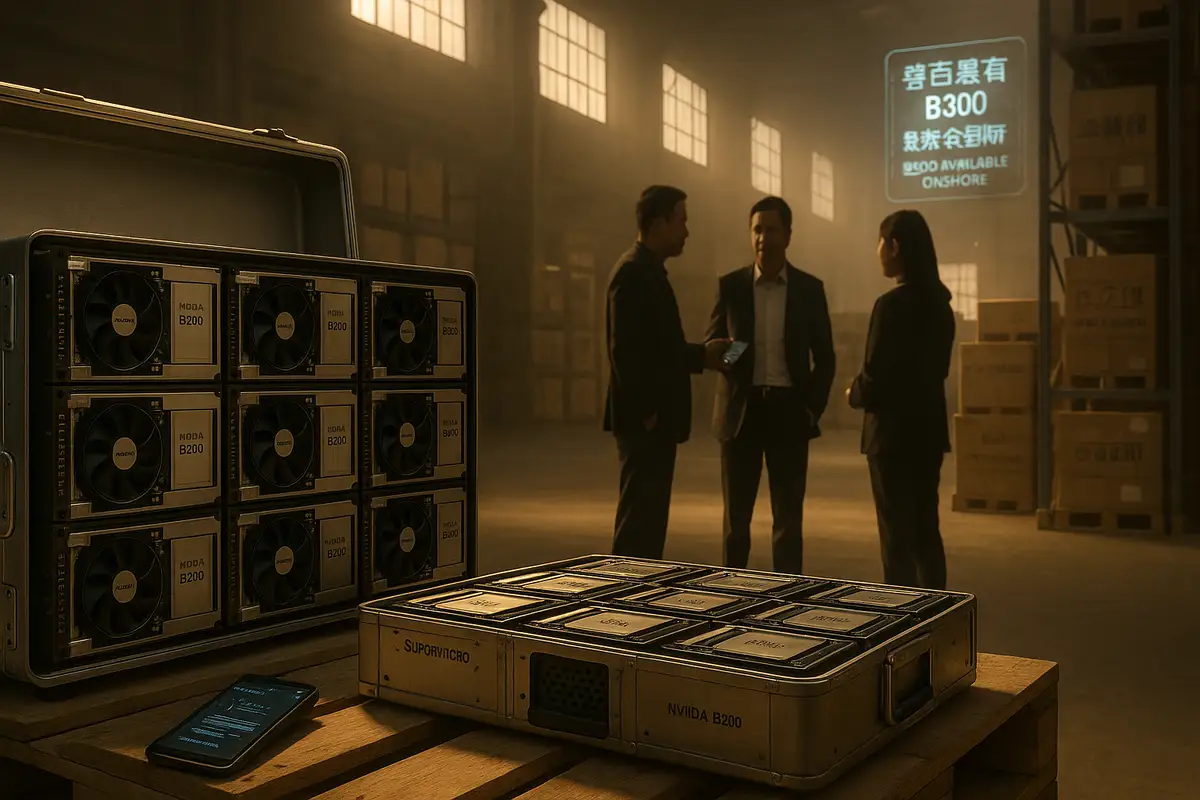
America tried to starve China's AI ambitions by blocking chip exports. The plan didn't work.
While Washington crafted export controls, smugglers moved over $1 billion worth of banned Nvidia processors into China in just three months. Companies like "Gate of the Era" sold forbidden B200 chips in ready-built racks for $489,000 each — a 50% markup over US prices.
The black market operates openly. Chinese distributors advertise banned semiconductors on social media with photos of Dell and Supermicro packaging. Buyers test chips before purchase like they're shopping for vegetables.
"It's like a seafood market," one distributor said. "There's no shortage."
The policy whiplash makes this worse. Trump blocked Nvidia's H20 chip sales in April, citing security concerns. Last week, he reversed course after Nvidia lobbying. CEO Jensen Huang claimed Chinese competitor Huawei had developed equivalent chips.
That's false. Huawei chips power just 3% of global supercomputing and the company makes only 200,000 advanced processors annually.
Meanwhile, export controls pushed Chinese firms toward domestic alternatives. Cybersecurity company Qihoo 360 now buys Huawei chips instead of waiting for American ones.
Why this matters:
• Export controls failed to block access while accidentally accelerating China's domestic chip development.
• Policy reversals signal inconsistency that undermines future cooperation on technology restrictions.
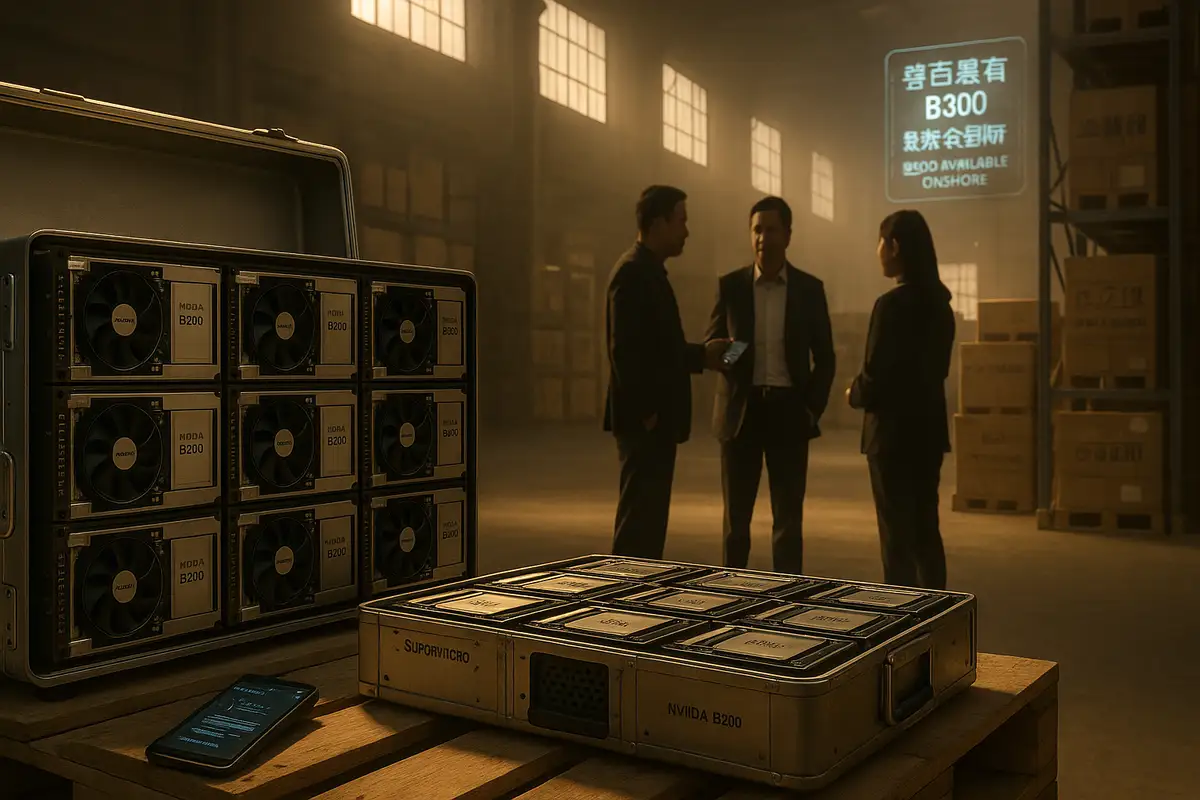
🧰 AI Toolbox
How to Handle Customer Calls with AI

echowin answers your phone calls and talks to customers like a human. It transcribes calls in real time, understands what customers need, and gives personalized responses. You can jump in anytime to take over.
Tutorial:
- Sign up for an echowin account
- Connect your phone system to the platform
- echowin transcribes all calls automatically in real time
- The AI analyzes customer mood and provides insights
- Use suggested responses to guide conversations
- Get summaries of each call automatically
- Use insights to improve customer service
URL: https://echo.win/
AI & Tech News
Google claims 2 billion people use its AI search summaries
Google announced that 2 billion people now use AI Overviews in search results, while its Gemini app hit 450 million monthly users and the company doubled its AI processing to 980 trillion monthly tokens since May. Investors weren't impressed by the victory lap, sending the stock down after Google revealed plans to spend even more money chasing the AI race.
Search giant's AI feature turns 99% of users into non-clickers
New research shows only 1% of Google users click through to actual websites after seeing AI Overview summaries, effectively strangling traffic to the publishers who create the information. Meanwhile, the AI summaries themselves are easily manipulated—one artist fooled Google into presenting his fictional "parasitic brain theory" as real science just by posting about it on social media for a few hours.
Film exec takes over troubled AI company, promises to play nice with artists
Prem Akkaraju stepped into Stability AI's CEO role last June, inheriting a company drowning in debt, lawsuits, and bad press after its founder fled. The former visual effects executive now claims he's building a "Spotify for images" where artists can get paid for AI training data – presumably hoping they'll drop those pesky copyright lawsuits.
AMD confirms what everyone suspected: US chips cost more
AMD CEO Lisa Su confirmed Wednesday that chips from TSMC's Arizona facilities cost 5-20% more than identical parts made in Taiwan, with the company expecting its first US-made semiconductors by year-end. Su defended the premium as necessary for supply chain resilience, noting that TSMC's Arizona plant already matches Taiwan's production yields despite the higher costs.
China tries to fix its data center mess with national cloud network
China built thousands of government-backed data centers during a three-year boom that created a massive capacity glut, with utilization rates stuck around 20-30% and over 100 projects cancelled in the past 18 months. Now Beijing is scrambling to create a national cloud service that can sell surplus computing power from these struggling facilities, though technical challenges like incompatible chips and sluggish data transfer speeds make the rescue plan look dicey.
New benchmark shows AI programmers aren't ready to replace humans just yet
The K Prize AI coding challenge crowned its first winner this week when Brazilian prompt engineer Eduardo Rocha de Andrade scored a whopping 7.5% correct answers and walked away with $50,000. The "contamination-free" test used only fresh GitHub issues to avoid the training data pollution that inflates scores on other benchmarks like SWE-Bench, where top performers claim 75% accuracy – apparently a much rosier picture than reality.
T-Mobile launches Starlink texting for everyone, even non-customers
T-Mobile's new T-Satellite service lets anyone with a compatible phone send texts via Starlink satellites when cellular towers fail, charging $10 per month initially before jumping to $15. The service works on over 60 unlocked phones nationwide, though it only handles basic texting and location sharing for now while voice messages and apps wait in the wings.
Wireless charging gets faster as Android phones finally join the party
The Wireless Power Consortium launched faster Qi2 25W wireless charging with iPhones and "major Android smartphones" getting support for the first time, jumping up from the previous 15W limit. Until now, only one Android phone fully supported the magnetic Qi2 standard, while Samsung's flagships needed special cases to work properly.
Itch.io dumps adult games after credit card companies get squeamish
Itch.io abruptly pulled adult content from its browse and search pages Thursday, citing payment processor concerns about NSFW games hosted on the indie platform. The move mirrors Steam's recent adult content purge and Tumblr's infamous 2018 porn ban, suggesting credit card companies are tightening their grip on what gamers can buy with plastic.
Robotaxis finally work, but the math still doesn't
Waymo now operates over 250,000 paid robotaxi rides weekly across five US cities while Tesla and Amazon's Zoox race to catch up, but the vehicles cost around $150,000 each and no company has proven the business can actually make money. With ride-hailing margins notoriously thin and robotaxi fleets requiring billions in capital, the industry faces a harsh reality check on whether replacing human drivers makes financial sense beyond Silicon Valley's wealthy suburbs.
Better prompting...
Today: Social Media Campaign Plan for Charity Event
Create a social media campaign plan for [specific charity event - e.g., food drive, fundraising gala, volunteer recruitment]. Include:
Campaign basics:
- Target audience and their preferred platforms
- Campaign timeline (pre-event, during, post-event phases)
- Budget range and resource requirements
Platform strategy:
- Which 3-4 platforms to focus on and why
- Content types that work best for each platform
- Posting frequency and optimal timing
Content plan:
- 5-7 core message themes that connect to your cause
- Mix of content formats (posts, stories, videos, user-generated content)
- How to showcase impact and build trust
Engagement tactics:
- Ways to get supporters sharing and participating
- Hashtag strategy and community-building approaches
- How to handle responses and build conversations
Success metrics:
- What you'll track to measure impact
- How you'll know the campaign worked
Make this actionable with specific examples, suggested post copy, and a week-by-week timeline.
AI decodes 2,000-year-old Roman texts in seconds

Google DeepMind released an AI that reads damaged Roman inscriptions faster than human experts. The system, called Aeneas, analyzes Latin text carved into monuments, tombstones, and everyday objects across the ancient empire.
Romans carved words everywhere. Archaeologists find 1,500 new inscriptions yearly, most broken with missing words. Historians spend days hunting through databases for similar texts to understand what damaged inscriptions might say.
Aeneas learned from 176,000 Latin inscriptions spanning seven centuries. It finds connections between texts by recognizing writing patterns, not just matching words. The AI can fill gaps even when nobody knows how many letters are missing.
Researchers tested Aeneas with 23 expert historians. When historians used the AI's suggestions, their accuracy jumped from 27% to 68% for identifying where inscriptions came from. Error rates for restoring missing text dropped from 39% to 21%.
The team proved Aeneas works by analyzing the Res Gestae Divi Augusti—Emperor Augustus's famous account of his achievements. The AI produced two possible dates for when Augustus wrote it, perfectly capturing the scholarly debate historians have argued about for decades.
The tool is free online at predictingthepast.com for anyone to use.
Why this matters:
• What took historians days now happens in seconds, freeing experts to focus on interpretation rather than detective work.
• Students and small institutions get the same research power that only major universities had before.

Why Gemini Beats ChatGPT at YouTube Analysis—By Watching the Video
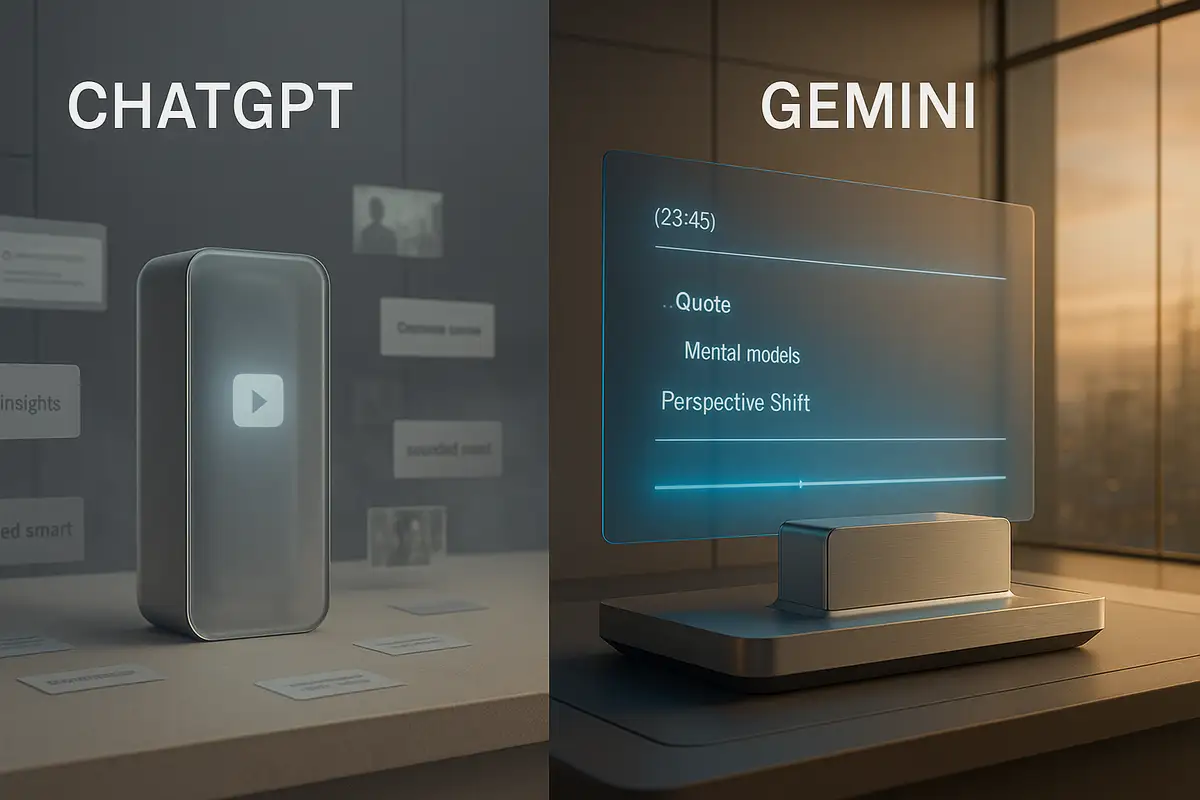
Your ChatGPT YouTube summaries probably suck.
Here's why: ChatGPT can't actually watch videos. It's basically playing telephone with whatever transcript scraps it can find. Meanwhile, you're getting generic fluff that could've been written about any business video ever made.
Gemini? Different story entirely.
The Problem With ChatGPT 🤖
ChatGPT treats YouTube links like mystery boxes. It'll give you something, sure.
But you'll get:
• Vague generalizations that sound smart but say nothing
• "Key insights" that are actually just common sense wrapped in business jargon
• Hallucinated details that never happened in the video
• The same templated structure every single time
It's like asking someone to review a movie they've never seen.
Why Gemini Actually Works 🎯
Google owns YouTube. Shocking, right? This means Gemini can:
• Pull the actual transcript directly
• Cross-reference timestamps with content
• Understand context and nuance
• Give you specific quotes with exact timing
The difference isn't subtle. It's night and day.
Get the complete step-by-step tutorial and copy the exact Gemini prompt at implicator.ai →

🚀 AI Profiles: The Companies Defining Tomorrow

Lightyear: Europe's Zero-Fee Trading Disruptor
Lightyear brings Robinhood-style commission-free trading to Europe's fragmented markets. The fintech startup has cracked the code on cross-border investing with multi-currency accounts and rock-bottom FX fees.
The Founders 🚀 Martin Sokk and Mihkel Aamer launched Lightyear in 2021 after witnessing Europe's "ugly" investing landscape at Wise. The London-based company (with Estonian roots) targets the 75% of European wealth sitting outside stocks—a massive untapped market.
The Product 💪 Zero trading commissions across 5,000+ stocks and ETFs in 25 countries. Multi-currency wallets let users dodge brutal FX fees that plague European investors. New AI features like "Why Did It Move" and "Bulls Say, Bears Say" democratize Wall Street-grade research. Plus fractional shares and 3% interest on cash.
The Competition ⚔️ Trade Republic dominates continental Europe with $5B+ valuation and million-plus users. Revolut offers limited free trades before hitting paywalls. Freetrade owns UK retail. Lightyear's edge? True pan-European reach with unlimited free trading and superior international access.
Financing 💰 $58M raised total. Star-studded backers include Wise founder Taavet Hinrikus, Skype's Jaan Tallinn, and Bolt CEO Markus Villig. Latest $23M Series B values the company at $200-300M. Hit $1B in customer assets—impressive for a five-year-old startup.
The Future ⭐⭐⭐⭐ Strong prospects. Lightyear's timing is perfect as European retail investing explodes. AI integration shows innovation chops, while crypto plans target long-term holders over day-traders. Faces brutal competition but commands first-mover advantage in unified European platform play. 🎯



